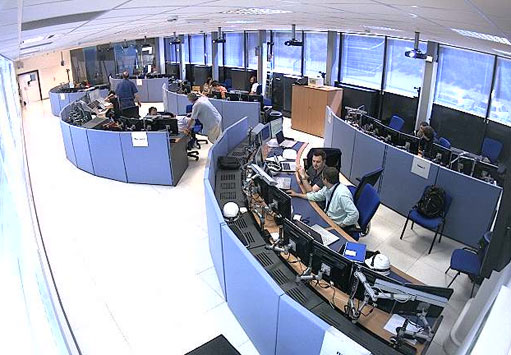
SOURCE
To get any physics out of ATLAS, we must manage the data that will course through its cables, from the shifts in the control room to data distribution and software. Christophe Clement, Run Coordinator of ATLAS, describes this important work as less visible since it doesn’t directly result in papers. “And there’s a lot of it,” he adds. “Nevertheless, this is the work that really makes you feel you are carrying out an experiment which has to do with reality.”Control room tasks make up only about 13 per cent of the operation activities, according to Steinar Stapnes, who deals with Operation Task overall planning in ATLAS almost daily, yet they are essential. “Any failure in coverage can have bad consequences, perhaps for hardware and certainly for data taking,” he says.Each institute needs to take its turn on shift; this critical work cannot be compensated for with other contributions that are easier to accomplish remotely or require less diligent attention. For this reason, the Operation Task Planning group has split the operation tasks into two categories: 1 and 2.Category 1 tasks are the real-time operation and monitoring of detector performance, and first line of defence when problems arise, carried out by shifters in the control room and the experts who are called in at anytime of the day or night, should something go wrong. “We make sure that these very important tasks are well-covered. Everybody should feel responsible for them,” says Steinar.He also emphasizes the tradition in particle physics of making sure that graduate students and post-docs get time in the driver’s seat. “For most young people, it’s incredibly interesting, educational, and rewarding for them to get the experience of being part of the team that operates the detector,” says Steinar.Anything beyond the shifts will be Category 2. This includes data acquisition and core software development and maintenance, databases, calibrations, managing data distribution through the Grid, recalibration of data as the detectors are better understood, and software tuning. Category 2 also comprises other tasks associated with processing the data for analysis and those related to longer-term hardware and software maintenance at Point 1.Along with the special designation for shifts and on-call time, the scheduling system has changed. Run Coordination wants to foster a team spirit among the shifters, bringing groups together multiple times over the course of a week. Christophe explained that in this team-based system, shifters: “Get to know the other crew members better, make new contacts, and become more confident with the operation of their sub-detector. Basically work more as a crew.” “It’s not something new in some sense; other experiments have done similar things,” says Steinar, “but it is different with ATLAS because of a larger crew and a large collaboration.”Since collaborators may only work shifts for a maximum of six consecutive days, Run Coordination tried to make a schedule with eight-day blocks, each shifter taking one day off during the block. However, this was in the end deemed too rigid, both for people travelling to CERN to do shifts and for CERN residents. This resulted in a spontaneously generated version with three- and four-day blocks. An unintended consequence was that visiting physicists were inclined to take two blocks in succession, resulting in seven consecutive shifts. CERN safety regulations must be respected, so Run Coordination adjusted the system to allow shifters to choose two consecutive three-day shifts.

This system is also designed to respect the experts who are on-call. In the pattern above, those who work over the weekend have at least a Friday’s worth of experience. This way, the teams are more likely to be able to handle problems without calling in an expert. Christophe notes that on the first day, shifters tend to do some re-learning, but during the rest of a block: “you’ve done this yesterday, and you know what is the problem and how to fix it.”Also, those who take night shift must have recent experience on a day or evening shift, to avoid exhausting the on-call experts with midnight questions and visits to the Control Room. Between the category definitions and block scheduling for shifts, the running of the ATLAS detector should be smooth and effective, with each institution carrying its weight on the front lines.The system starts up Week 26 (28 June to 4 July). For more information or to book a shift, check the webpage.
Katie McAlpine
ATLAS e-News

















Nessun commento:
Posta un commento